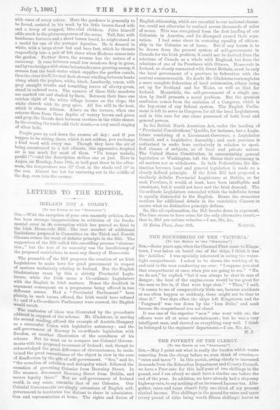LETTERS TO THE EDITOR.
IRELAND NOT A COLONY.
[To THE EDITOIE OF THE "SPECTATOR.'] SIR.—With the exception of your own masterly articles, there has been strange inappreciation in criticism of the funda- mental error in its conception which has proved so fatal to the Irish Home-rule Bill. The vast number of additional limitations proposed in Committee on the Third and Fourth Clauses evince the want of definite principle in the Bill. The supporters of the Bill called this amending process " obstruc- tion; " but the test of its necessity was the insufficiency of the proposed restrictions to meet any theory of Home-rule.
The preamble of' the Bill proposes the creation of an Irish Legislature to make laws for good government in respect of matters exclusively relating to Ireland. But the English Gladstonians mean by this a strictly Provincial Legis- lature, while the Irish mean a Co-ordinate Legislature with the English in Irish matters. Hence the deadlock in argument consequent on a programme being offered in two 'different senses. Had a "Provincial Parliament" been plainly, in such terms, offered, the Irish would have refused it ; and if a Co-ordinate Parliament were avowed, the English would revolt.
The confusion of ideas was illustrated by the precedents adduced in support of the scheme. Mr. Gladstone, in moving the second reading, offered the example of Austria-Hungary as a successful Union with legislative autonomy ; and the self-government of Norway in co-ordinate legislation with Sweden, as another illustration of the soundness of his scheme. But he went on to compare our Colonial Govern- ments with his proposed treatment of Ireland; and, though he acknowledged the great difference of circumstances, he main- tained the great resemblance of the object in view in the cure of disaffection by the gift of self-government. "See," said he, "the cessation of rebellion and disloyalty which followed the cessation of governing Colonies from Downing. Street. In like manner, disconnect Downing Street from Dublin, and secure loyalty there." But no self-government of Ireland could, in any sense, resemble that of our Colonies. Our Colonial Governments are simply extensions of English self- government in territories too distant to share in administra- tion and representation at home. The rights and duties of English citizenship, which are essential to our national charac- ter, could not otherwise be realised across thousands of miles of ocean. This was recognised from the first landing of our Colonists in America, and its disregard caused their sepa- ration. I had some share in restoring equality of citizen- ship in the Colonies as at home. But if any lesson is to be drawn from the present system of self-government in Canada for the Irish problem, it could not be derived from the relations of Canada as a whole with England, but from the relations of one of its Provinces with Ottawa. Home-rule in Ireland, so closely connected with Great Britain, must be only the local government of a province in federation with the central commonwealth. No doubt Mr. Gladstone contemplates a more complete federation of local autonomies, others being set up for Scotland and for Wales, as well as that for Ireland. Meanwhile, the self-government of a single sec- tion by itself presents a novel problem. But the greatest confusion comes from the omission of a Congress, which is the key-stone of any federal system. The English Parlia- ment is left to serve as Congress for all the local Legislatures, and in this case for one alone possessed of both local and general powers.
In the British North American Act, under the heading of "Provincial Constitutions," Quebec, for instance, has a Legis- lature consisting of a Lieutenant-Governor, a Legislative Council, and a Legislative Assembly ; and each province is authorised to make laws exclusively in relation to speci- fied classes „I subjects, as of local and private nature. The United States Constitution, in concentrating general legislation at Washington, left the States their autonomy in all matters not so withdrawn. In both Federations, the dis- tinction between local and general legislation is made on a clearly defined principle. If the Irish Bill had proposed a similarly definite Provincial Legislature at Dublin, or for each Province, it would, at least, have been intelligible and consistent, but it would not have met the Irish demand. The Co-ordinate Legislature concealed within the indefinite terms is equally distasteful to the English. Hence the numerous motions for additional details in the restrictive Clauses to secure what no distinctive principle defines.
So, like all equivocation, the Bill breaks down in argument. The time seems to have come for the only alternative resort,— that is, Stet pro ratione voluntas.—I am, Sir, &c.,










































 Previous page
Previous page